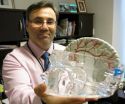(Press-News.org) TORONTO, Aug. 27, 2014 – Stroke patients are 70 per cent more likely to continue taking their stroke prevention medications one year later if they have a prescription in hand when discharged – according to researchers at St. Michael's Hospital and the Institute for Clinical Evaluative Sciences (ICES).
Using data from 11 stroke centres, researchers determined how many Ontarians were taking their medications one week, one year and two years after having a stroke. The results reveal the importance of simple interventions, such as giving a prescription to a patient before discharge, to increase short- and long-term stroke prevention.
"The good news is that Ontarians are receiving very good stroke care overall," said Dr. Gustavo Saposnik, lead author of the study and director of the Stroke Research Unit of St. Michael's Hospital. "But there are still things we can do to help patients receive better quality, long-term care after a stroke. And the first thing on that list is giving each patient a prescription before he or she leaves as part of discharge planning."
According to the Heart and Stroke Foundation, there are an estimated 50,000 strokes in Canada each year. After having a stroke or minor stroke, the risk of having another stroke is greater. The risk of recurrence, however, can be reduced by more than 80 per cent by following stroke prevention strategies such as rehabilitation and taking medications.
Dr. Saposnik said that at the time of discharge most patients are more focused on the tangible issues of their recovery, such as: "What will happen at rehab?" or "What will happen when I go home?"
"Patients have other things on their minds after a stroke and it's up to us to give them the tools they need to thrive," said Dr. Saposnik, who is also an adjunct scientist at ICES.
The two types of drugs most commonly prescribed after a stroke are antihypertensives (to lower blood pressure) and statins (to lower blood cholesterol). Patients may be prescribed one of these drugs or both. Patients may remain on these drugs for the rest of their lives to prevent another stroke. About 315,000 Canadians are living with the effects of stroke.
Stroke patients who had been given a prescription before discharge were 70 per cent more likely than other patients to still be taking both antihypertensives and statins one year later and 40 per cent more likely after two years.
There are several reasons why a patient might be discharged before receiving a prescription. Doctors may assume their patient will receive a prescription from a family doctor, whom patients are supposed to see within seven days of discharge. Another reason some patients leave without a prescription is that the prescription might be dictated in the chart but not actually delivered to patients.
INFORMATION:
This study, published in The Journal of Stroke and Cerebrovascular Disease, was supported in part by the Ontario Stroke Network, the Heart and Stroke Foundation of Canada and the Ontario Ministry of Health and Long-Term Care.
About St. Michael's Hospital:
St. Michael's Hospital provides compassionate care to all who enter its doors. The hospital also provides outstanding medical education to future health care professionals in 27 academic disciplines. Critical care and trauma, heart disease, neurosurgery, diabetes, cancer care, care of the homeless and global health are among the hospital's recognized areas of expertise. Through the Keenan Research Centre and the Li Ka Shing International Healthcare Education Centre, which make up the Li Ka Shing Knowledge Institute, research and education at St. Michael's Hospital are recognized and make an impact around the world. Founded in 1892, the hospital is fully affiliated with the University of Toronto.
About ICES:
ICES is an independent, non-profit organization that uses population-based health information to produce knowledge on a broad range of health care issues. Our unbiased evidence provides measures of health system performance, a clearer understanding of the shifting health care needs of Ontarians, and a stimulus for discussion of practical solutions to optimize scarce resources. ICES knowledge is highly regarded in Canada and abroad, and is widely used by government, hospitals, planners, and practitioners to make decisions about care delivery and to develop policy. For the latest ICES news, follow us on Twitter: @ICESOntario
Media contacts:
Geoff Koehler
Media Relations Adviser
St. Michael's Hospital
koehlerg@smh.ca
416-864-6060, ext. 6537
Deborah Creatura
Media Advisor
ICES
deborah.creatura@ices.on.ca
(o) 416-480-4780 or (c) 647-406-5996
A prescription for better stroke care
2014-08-27
ELSE PRESS RELEASES FROM THIS DATE:
The roots of human altruism
2014-08-27
VIDEO:
Sakis play the group service game.
Click here for more information.
Scientists have long been searching for the factor that determines why humans often behave so selflessly. It was known that humans share this tendency with species of small Latin American primates of the family Callitrichidae (tamarins and marmosets), leading some to suggest that cooperative care for the young, which is ubiquitous in this family, was responsible for spontaneous helping behavior. But it ...
Fighting prostate cancer with a tomato-rich diet
2014-08-27
Men who eat over 10 portions a week of tomatoes have an 18 per cent lower risk of developing prostate cancer, new research suggests.
With 35,000 new cases every year in the UK, and around 10,000 deaths, prostate cancer is the second most common cancer in men worldwide.
Rates are higher in developed countries, which some experts believe is linked to a Westernised diet and lifestyle.
To assess if following dietary and lifestyle recommendations reduces risk of prostate cancer, researchers at the Universities of Bristol, Cambridge and Oxford looked at the diets and lifestyle ...
Leading scientists call for a stop to non-essential use of fluorochemicals
2014-08-27
Fluorochemicals are synthetically produced chemicals, which repel water and oil and are persistent towards aggressive physical and chemical conditions in industrial processing. These characteristics have made the fluorochemicals useful in numerous processes and products, such as coatings for food paper and board.
The problem with fluorochemicals is that they are difficult to break down and accumulate in both humans and the environment. Some fluorochemicals have known correlations with harmful health effects, such as cancer, increased cholesterol and a weaker immune system ...
Penn paleontologists describe a possible dinosaur nest and young 'babysitter'
2014-08-27
Dinosaurs are often depicted as giant, frightening beasts. But every creature is a baby once.
A new examination of a rock slab containing fossils of 24 very young dinosaurs and one older individual is suggestive of a group of hatchlings overseen by a caretaker, according to a new study by University of Pennsylvania researchers.
Penn's Brandon P. Hedrick and Peter Dodson led the work, collaborating with researchers from China's Dalian Museum of Natural History, where the specimen is held. Hedrick is a doctoral student in the School of Arts & Sciences' Department of Earth ...
Potential therapy for incurable Charcot-Marie-Tooth disease
2014-08-27
This news release is available in German.
Charcot-Marie-Tooth disease type 1A is the most common inherited disease affecting the peripheral nervous system. Researchers from the Department of Neurogenetics at the Max Planck Institute of Experimental Medicine and University Medical Centre Göttingen have discovered that the maturity of Schwann cells is impaired in rats with the disease. These cells enwrap the nerve fibres with an insulating layer known as myelin, which facilitates the rapid transfer of electrical impulses. If Schwann cells cannot mature correctly, ...
Potential therapy for the Sudan strain of Ebola could help contain some future outbreaks
2014-08-27
Ebola is a rare, but deadly disease that exists as five strains, none of which have approved therapies. One of the most lethal strains is the Sudan ebolavirus (SUDV). Although not the strain currently devastating West Africa, SUDV has caused widespread illness, even as recently as 2012. In a new study appearing in the journal ACS Chemical Biology, researchers now report a possible therapy that could someday help treat patients infected with SUDV.
John Dye, Sachdev Sidhu, Jonathan Lai and colleagues explain that about 50-90 percent of ebola patients die after experiencing ...
How to prevent organic food fraud
2014-08-27
A growing number of consumers are willing to pay a premium for fruits, vegetables and other foods labelled "organic", but whether they're getting what the label claims is another matter. Now scientists studying conventional and organic tomatoes are devising a new way to make sure farms are labelling their produce appropriately. Their report, which appears in ACS' Journal of Agricultural and Food Chemistry, could help prevent organic food fraud.
Researchers from the Bavarian Health and Food Safety Authority and the Wuerzburg University note that the demand for organic ...
New study throws into question long-held belief about depression
2014-08-27
New evidence puts into doubt the long-standing belief that a deficiency in serotonin — a chemical messenger in the brain — plays a central role in depression. In the journal ACS Chemical Neuroscience, scientists report that mice lacking the ability to make serotonin in their brains (and thus should have been "depressed" by conventional wisdom) did not show depression-like symptoms.
Donald Kuhn and colleagues at the John D. Dingell VA Medical Center and Wayne State University School of Medicine note that depression poses a major public health problem. More than 350 million ...
Fear, safety and the role of sleep in human PTSD
2014-08-27
The effectiveness of post-traumatic stress disorder (PTSD) treatment may hinge significantly upon sleep quality, report researchers at the University of California, San Diego School of Medicine and Veterans Affairs San Diego Healthcare System in a paper published today in the Journal of Neuroscience.
"I think these findings help us understand why sleep disturbances and nightmares are such important symptoms in PTSD," said Sean P.A. Drummond, PhD, professor of psychiatry and director of the Behavioral Sleep Medicine Program at the VA San Diego Healthcare System. "Our study ...
Men who are uneducated about their prostate cancer have difficulty making good treatment choices
2014-08-27
They say knowledge is power, and a new UCLA study has shown this is definitely the case when it comes to men making the best decisions about how to treat their prostate cancer.
UCLA researchers found that men who aren't well educated about their disease have a much more difficult time making treatment decisions, called decisional conflict, a challenge that could negatively impact the quality of their care and their long-term outcomes.
The study should serve as a wake-up call for physicians, who can use the findings to target men less likely to know a lot about their ...



